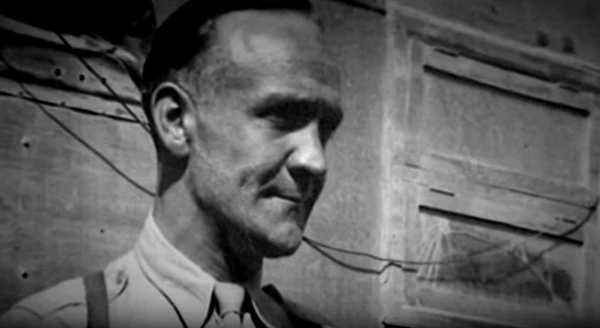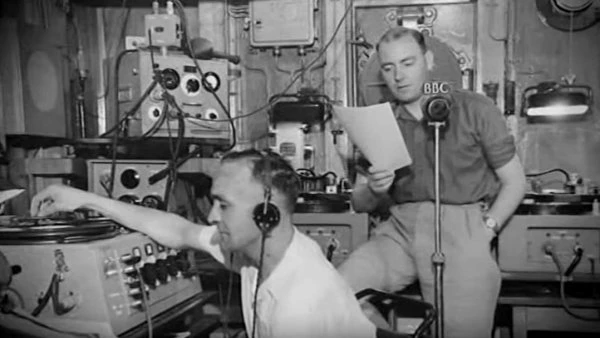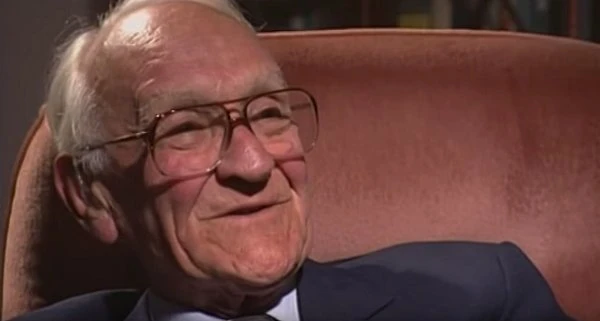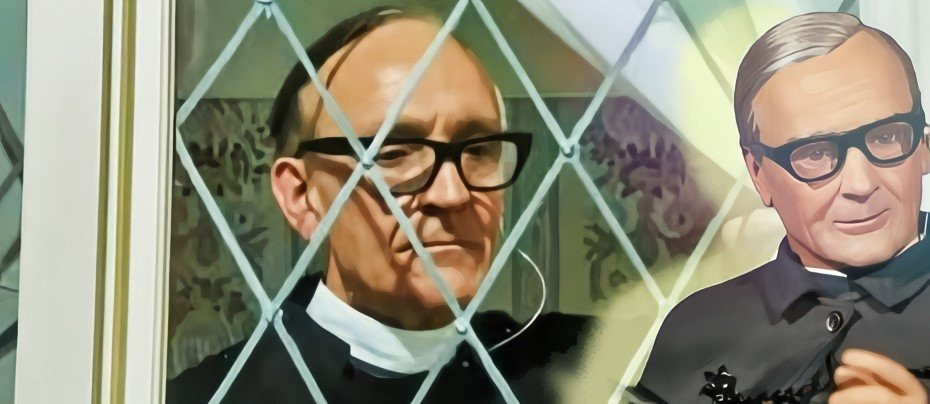
Stanley Unwin
Are you all sitty comftybold two-square on your botty? Then I'll begin.
In a country famed for its literary giants, Shakespeare, Tennyson, Wordsworth, Marvell, Bacon, Bronte, Browning and Dickens, Stanley Unwin stands out alone as a man recognised and lauded for his oratory, not because he was an exceptional speaker of the English language, but because he invented his own language, "Unwinese."
"Professor" Stanley Unwin specialised in speaking an unfathomable verse complete with plausible malapropisms and poetic gobbledegook. It lasted throughout the last days of variety, through the halcyon days of radio comedy, bought him cult status in the 60's and lasted throughout his lifetime into the 21st Century.
No other man has been able to spout complete "gibberish" yet make it seem perfectly simple what he was going on about.
"Unwinese” was a special form of English in which a few words were intelligible making the listener think he was completely unable to understand what was being said, yet somehow at the same time could. The results of this fascinating language were hilariously confusing.
It was Stanley's mother that unwittingly inspired him to develop this strange language when she fell over one day and told him she had "falolloped" and cut her "kneeclappers." Stanley further developed this by reading fairy tales to his children.

Stanley Unwin was born on the 7 June 1911 in Pretoria, South Africa, after his mother & father had emigrated there in early part of the 20th Century. His father, Ivan, died in 1914 and a year later, his mother returned to England with Stanley and promptly packed off to boarding school and children’s homes. He had an older brother, Oswald & 2 sisters, Gladys and Eveline. Oswald died at the age of 8 after suffering appendicitis.
During the 1st World War, Stanley was evacuated to several homes mainly across the Essex area and had little contact with his mother & sisters. After the war had ended, he was sent in 1919, to the National Children's Home in Congleton, Cheshire. It was whilst here that Stanley joined a local choir, which toured the country. It was during one of these tours, in Belle Vue, Manchester, that he came across "A large trolley, like those in a hotel dining room but larger, pushed along by 2 men. There was an array of coiled wires and terminals upon it, and wires leading to other wires strung across 2 poles supported at each end of the trolley." This contraption he found out was called a transmitter, and this encounter with one inspired him to buy an early crystal wireless set which was the start of a hobby that later turned into a highly successful career.
In the mid 1920's Stanley wanted to emigrate to Canada but was instead sent to Gibb's Nautical Training School in Penarth, South Wales where he learnt about wireless telegraphy and sailor’s knots. Here he obtained a first class Postmaster General's Certificate, in September 1927. A month later, he was posted on the SS Bakana where he discovered he was very prone to seasickness.

After 2 tours of duty with the Bakana, Stanley landed a job with wireless manufacturer Peto Scott in Hoxton, London, but was soon fired after he played a practical joke by exploding some gas inside a box his boss was sitting on. When he asked for a reference, his boss replied: "Reference? I'll give you a reference - as a comedian."
He then had a number of jobs over the next year or so before he was hired by the Plessey Company to work in a new field known as radio. This appointment was to prove life changing for Stanley for more than one reason.
In the late 1920's Stanley went to Regent Street Polytechnic to learn German & French and it was during this time that he developed his unique language when, as he himself put down to the moment when his mother tripped up while walking and told him that she "falolloped in front of a tram and grazed her kneeclappers."
It was while Stanley was at Plessey's that he met his future wife Frances and also where Stanley obtained a turn of phrase that he would be forever associated with even though he didn't come up with it himself. He was having trouble with an oscilloscope when his boss Douglas Jones, came up to him and asked him if he had "any joy?" Stanley replied that he hadn't and continued to wrestle with the problem further. His boss returned sometime later and by then the problem had been overcome. "Any Joy Stanley?" asked Mr Jones, "Joy" replied Stanley, to which his boss replied, "Deep Joy", and so an iconic catch phrase was born.

In 1940 Stanley began working at the B.B.C. on transmitters. The 2nd World War was under way and The Beeb needed Morse operators. Stanley was stationed at the Borough Hill transmitting station in Daventry. By now Stanley, his wife, Frances and their 9 month old daughter Marion, had moved to Long Buckby in Northamptonshire, where Stanley lived for the rest of his life.
In 1944 Stanley joined the BBC War Reporting Unit where he was assigned to the U.S. Third Army Press Camp & later the British Eighth Army in Italy and followed the Allied advance through Italy and into Austria just as the war was coming to an end.
When the war was over, he returned to The U.K. and joined the newly formed Mobile Recording Unit as an outside broadcast engineer. From 1947 to 1951 he was based in Birmingham working on local news transmissions for BBC West Midlands where he worked on, amongst others, 'Down Your Way'and 'Around & About' and worked with such broadcasters such as Richard Dimbleby and Wynford Vaughan Thomas.
It was during this period that Stanley got his first "starring" broadcast. He was testing equipment when broadcaster F.R. "Buck" Buckby approached Stanley for a chat. Stanley was about to try a recording, so he handed the microphone to Buckby who ad-libbed a spoof commentary about an imaginary sport called 'Fasche'. Buckby then encouraged Stanley to join in and introduced him as Codlington Corthusite. Handing him the microphone, Stanley continued in Unwinese. These fun and games lasted for a good few minutes. After the recording was played back to 2 producers, Peter Cairns and David Martin, who added some sound effects, it was aired on Pat Dixon's "Mirror of the Month" programme. (Dixon was later to go on and produce “The Goon Show”).
The piece received a good response, which led to another sketch in which Stanley was interviewed as a man from Atlantis and asked about life in the sunken city. It was after this broadcast that Stanley got his first piece of fan mail. It was from Joyce Grenfell who had been impressed by his performance. This gave Stanley a tremendous boost as Grenfell was Stanley's heroine.
Cairns and Martin persuaded him to meet the scriptwriter Ted Kavanagh, who wrote material for Tommy Handley, and see if he could make him laugh. Kavanagh thought Unwin "a minor comic genius". Encouraged by the praise, Stanley decided to try and break into showbiz as a full-time profession.

His next break came in North Africa where he was recording a series of shows by Frankie Howerd. In Egypt, Howerd got laid out by an local tummy bug known in those days as ‘The Pharaoh’s Revenge’ As a result the producer of the show sent out a call for anyone who could "do a turn." Stanley was pushed onto the stage and told to do a short fill in. Another unknown who filled in that day was Howerd's scriptwriter Eric Sykes.
Back in the U.K. and although Stanley's career as an engineer was going splendidly, he was beginning to do more on the performing side of the microphone, and his next major breakthrough came when producer Roy Speer took him to a meeting with one of the country's most famous stars of the day, Ted Ray. When Ray had heard him talking, he simply said "I want him in the series." The series was "The Spice of Life" which also featured June Whitfield and Kenneth Connor.
Stanley did about a dozen of these shows in the mid 1950's and met agent Johnnie Riscoe & his daughter Patsy who between them acted for him for the rest of his life.
Stanley's career took off at this point and by the end of the fifties had ventured into the film industry by landing a part in the Cardew Robinson film 'Fun at St Fanny's.'(1956)
Stanley became Uncle Stan on the radio programme ‘Children's Hour’ and did what he called "short bursts" on other broadcasts, as well as public dinners and variety shows.

During the 1960's amongst Stanley's film credits were 'Carry On Regardless' 'Press For Time' and 'Chitty Chitty Bang Bang.'The sixties were Stanley's "Golden Era" with the publishing of 3 books, 'The Miscillian Manuscript' (1961), 'House and Garbidge'(1962) and 'Rock - a - bye Babel' (1966), a single 'Goldilocks'(1962) and 2 albums 'Rotatey Disckers with Unwin’ (1961) and 'The World of Stanley Unwin’ (1967).
His ascension into cult status came at the end of the decade when in 1968 he recorded the part of the narrator on the six part side two of The Small Faces' album 'Ogden's Nut Gone Flake' a job he got because Spike Milligan was ill, and in 1969 when he became the first "live action star" of a Gerry Anderson series 'The Secret Service'.
He also had his own television show, Unwin Time, and guested for other entertainers, including Bernard Braden, David Nixon, Jimmy Tarbuck and Ted Ray.
During the rest of the Century and into the new Millennium Stanley was in great demand, turning up in advertising, game shows, chat shows and anything that needed a surreal twist to it. One of his last mainstream TV appearances was providing the voice of Mr Wangle in the first series of Rex The Runt in 1998.
Outside of his showbusiness work, Stanley was active in the local community, where he was President of the Daventry Choral Society.

At the age of 90 Stanley fell into ill health and on 12 January 2002 he died peacefully in his sleep at Dantre Hospital in Daventry. He had prepared his own valediction for his Service of Thanksgiving, which was held at St Lawrence's Church in Long Buckby: "Goodly Byeload loyal peeploaders, now all gatherymost to amuse it and have a tilty elbow or a nice cuffle-oteedee. Oh yes."
Stanley was buried in the churchyard at Long Buckby alongside his wife, who passed away in 1993. Their gravestone bears the epitaph: Reunitey in the heavenly-bode - Deep Joy!
Published on November 28th, 2019. Written by Phil McCormack (2006) for Television Heaven.










